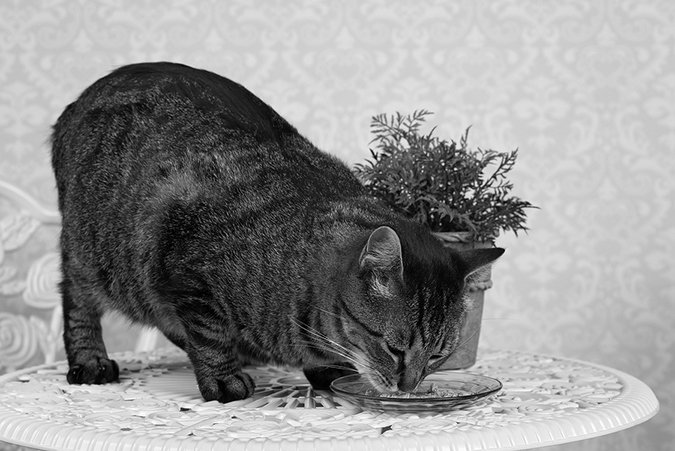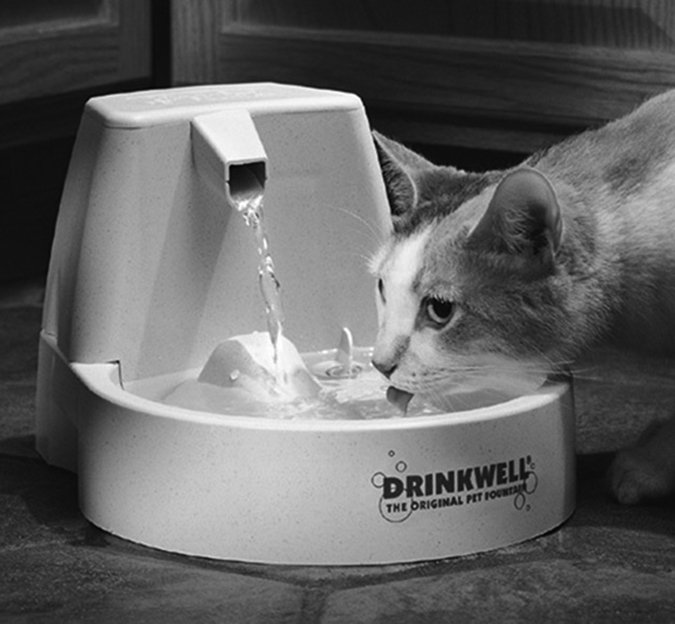Cats typically defecate one to three times a day, depending in part on the food they eat. Constipation — an inability to routinely and easily produce stool — is a fairly common feline disorder, says Meredith L. Miller, DVM, ACVIM, a lecturer in small animal medicine at Cornell University College of Veterinary Medicine.
“If the diet is low in fiber or contains indigestible hair or bones, constipation can be dietary. Dehydration, due to water restriction or reduced water intake, can also predispose a cat to be constipated,” she says.
No Urgent Threat
Occasional constipation may not pose a health threat. “For cats who strain to defecate and then pass foreign material like grass or hair, the situation may not be urgent,” says Dr. Miller. However, cats who haven’t defecated for more than a day or two or who repeatedly show signs of constipation or have other signs of illness — such as decreased appetite, lethargy or vomiting — should be seen by a veterinarian.
Serious blockages of the colon or rectum, as may be seen with cancer, foreign bodies and prostatic disease, can prevent defecation. “Inflammatory intestinal diseases or disorders of colonic motility can also lead to constipation or megacolon — a pathologic distension of the colon. Most commonly we see this in cats with chronic kidney disease. This in turn causes chronic dehydration, inflammatory bowel disease or megacolon,” says Dr. Miller.

The Susceptibility
While constipation can occur in any age or breed, some cats are particularly susceptible. “Megacolon is more of a problem in middle-aged cats. Similarly, chronic kidney disease primarily affects middle-aged to senior cats,” Dr. Miller says. “Manx cats may have spinal cord malformations that can lead to constipation.”
Longer-haired cats are prone to a different type of constipation — a condition called pseudocoprostasis, says Dr. Miller. “These cats are straining to defecate because of matted hair covering their anus, not because of any problem with their intestinal tract. Keeping longer-haired cats well groomed can help prevent this from occurring.”
Signs can alert owners that constipation may be developing. “Cats will posture and strain to defecate without producing fecal material. They may also cry out in pain when attempting to defecate,” Dr. Miller says. “When produced, the fecal material may appear unusually small or dry.” Again, cats will usually show the typical signs, such as loss of appetite, lethargy or vomiting that warrant a veterinary exam.
The Diagnosis
A veterinarian can often detect hard stool in the colon by palpation, as can an abdominal X-ray. A digital rectal exam will reveal any obstructions around the anus or in the rectum.

“If left untreated, a constipated cat can become obstipated — completely unable to defecate,” Dr. Miller says. This may necessitate hospitalization for intravenous fluids, enemas and stool softeners. It also might require anesthetizing the cat so a veterinarian can manually remove the obstructing stool. “Severe and chronic constipation can lead to colon distension, or megacolon, which can often be managed with medications and diet. However, in severe cases, this may require surgical removal of the colon.”
Given such consequences, she advises any underlying cause of constipation in cats be treated promptly. Enemas may be administered to hydrate and soften dried or impacted stool but should be performed only by a veterinarian. “If no underlying cause can be found, modification of the diet with increases in fiber may be recommended. “Your cat’s veterinarian may recommend a stool softener,” says Dr. Miller. “Good hydration and exercise are also important to keep your pets regular.”
The post-treatment prognosis for a constipated cat will vary depending upon underlying cause and treatment. “For instance, if a pet is impacted with grass or hair, a favorable prognosis is likely. A rectal mass, on the other hand, carries a less favorable prognosis,” says Dr. Miller. “In most cases, pets with persistent or recurrent bouts of constipation can be managed with nutritional changes, hydration, exercise and medication.”



